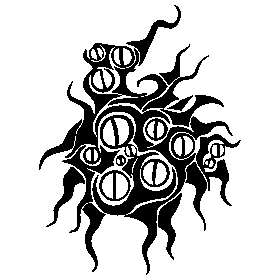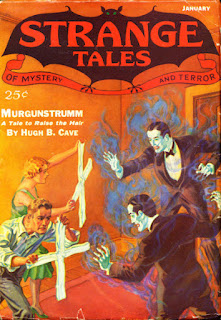 by Ramsey Campbell
by Ramsey Campbell
originally published Fantasy Tales #10, Summer 1982
Our Unnamed Narrator (Arrrrgghhh!! Another one!!!) is an author who lives alone, without a phone, in a bungalow along some English beach. In summer, he invites a friend, Neal, to come for an extended stay. It seems Neal has recently gotten divorced and had some kind of unspecified breakdown. UN seems to suffer from migraines or some such as well.
The beach isn't actually all that pleasant and no one seems to go there, but Neal and UN poke around. They find some odd little shells that should be too small to produce "seashell resonance" (yes there's actually an official name for that phenomena. Please note before you go thinking "Wow! This Aycorn guy is really smart!" that I had to look that one up) - but as it happens they do. Or something like it. By the time they get back UN is feeling like crapola, but Neal wants to explore the beach further. He's also got wind from some place about an abandoned village nearby that he'd like to check out. They decide to do so tomorrow. UN notices, disconcertingly, that beach seems glow, flickeringly, at night. And that this flickering glow produces the effect of odd figures moving or dancing jerkily in the light.
They find the ruins of the village - now nothing more than big chunks of slate that form a kind of maze-like structure rising out of the sand. In what might have been a cellar or basement, Neal finds an aged, fungus-y notebook. The incoherent writings within make reference to the beach, the flickering lights, dancing, moving sands, the beach making you go places or sucking you in, etc. UN dismisses it as mad ravings but Neal is fascinated and keeps studying it. He spends more and more time exploring the beach and environs while UN spends more and more time suffering from sunstroke or heat exhaustion or just in general being unfortunate enough to be the main protagonist in a Campbell story - which anyone who's read enough Campbell knows is not really a good thing to be.
Somewhere, Neal learns that the abandoned town was called Strand, and that they seemed to be fleeing the beach for reasons they wouldn't discuss. He claims to hear chanting in the sounds from the shells. Neal gets weirder and more hostile and spends less and less time at the bungalow. He talks about "patterns" ("when the pattern's ready it can come back") and the beach being some kind or alternate reality that was temporarily displaced by our reality, but is now reasserting itself and taking over.
The weirdness continues and UN can barely function. Neal is supposed to call a doctor but doesn't (or does one come?). UN sees what looks like him dancing on the flickering beach at night, buried up to his knees in sand.
Neal completely loses it and deafening, alien sounds come out of his mouth that sound like the odd sounds from the shells, only at massive volumes, then runs off into the night. UN finally manages to follow him out, and finds himself walking among debris and pieces of Neal's clothes. He realizes that the beach seems to be moving under him, the sand forming shapes (the debris are apparently not real but just shapes formed from sand - maybe), the weird sounds start up again. He flees back to the bungalow.
Inexplicably, he cannot bring himself to leave. He dreams (or are they dreams) of Neal's face coming out of the wall, making the weird sounds again. He starts to take long walks on the beach. One day he sees the sands form themselves into what looks like Neal's face. He too begins to contemplate "the pattern". He realizes that the beach, or the entity he thinks of as the beach, is expanding. One day it will encompass the world.
This is a difficult story to assess in my usual sarcastic terms. Campbell's intention was to tell a Lovecraftian tale without the usual name-dropping. And he certainly has achieved that here. The notebook and the abandoned village and its sketchy and unnerving history all echo Lovecraft tropes, and certainly this is as "cosmic" as "cosmic horror" gets. One could also note that the beach entity has a certain resemblance to critters like Abhoth and Ubbo-Sathla.
Campbell also cites it as the most successful of his Lovecraftian stories (c. 1982 anyway). And I guess that depends on what you consider success to be in this case.
The story is difficult because Campbell is difficult. Originally a devotee of HPL, he soon fell under the spell of other writers, especially Robert Aickman, a fine and celebrated writer of "strange stories", many of which could be rightly considered horror (but none of them even remotely Lovecraft-influenced). From Aickman Campbell learned implication and runaway surrealism. In Aickman's stories, bizarre events occur without explanation, and often the point of the story must be read between the lines. The best of them are remarkable; the worst merely weird and obtuse.
Campbell can have the same joy and the same problem. His characters, as Stephen King has noted, seem to walk around in a perpetual hallucinogenic trip, and everything is observed with weird and unpleasant metaphors - which may not be just metaphors. Towards the end of "Beach" UN sees a discarded baby buggy ( or "pram", to our English cousins) with a pile of sand on its roof. He sees the pile of sand open a sort of mouth shape at him. He thinks this is an illusion. But then again in the same scene he describes the debris turning out to be nothing but phony shapes made by the sand. So what was hallucination and what was real?
Moments like that make skimming a story like this impractical. You need to read it. And you need to read between the lines. And sometimes the answers still won't be there. At its best this can be entertaining - at is worst, infuriating. The most chilling moment in a Campbell story is in a tale he now semi-repudiates called "Trick Or Treat". A girl is haunted by a nightmare she had as a child of a grotesque, monkey-like face peering in her bedroom window at her. Years later, she and another girl find themselves in a pit of horrors while searching for her friend's lost dog. The monkey-like figure appears, and the girl's friend screams because she also recognizes it ("Oh no! The Monkey!"). Nothing more is said but the meaning is clear to us and the girl - the face at her window was not a dream.
Unfortunately, in Campbell's lesser stories and, too often, his novels, the neurotic protagonists continual bizarre interior monologues, the what-was-it, was-it-real and what-the-fuck-is-going-on tend to get tiresome.
There is one paragraph towards the end of the story, that for me articulates the nature of Lovecraft's greater stories very simply:
I was fleeing the knowledge, deep-rooted and undeniable, that what I perceived blotting out the sky was nothing but an acceptable metaphor. Appalling though the presence was, it was only my mind's version of what was there - a way of letting me glimpse it without going mad at once.
Which is what HPL was saying as far back as "The Call of Cthulhu" after all.
So in that sense, I suppose it is very successful as a Lovecraftian story.
On the other hand, I've read "Beach" twice sine the mid-80's and couldn't remember much about it. Just a couple guys living on the beach and one goes nutso (which is essentially correct). There are other Campbell stories that have stuck with me more and which I enjoy reading more, even if they are less "successful." Something of a compromise score here, but:


































